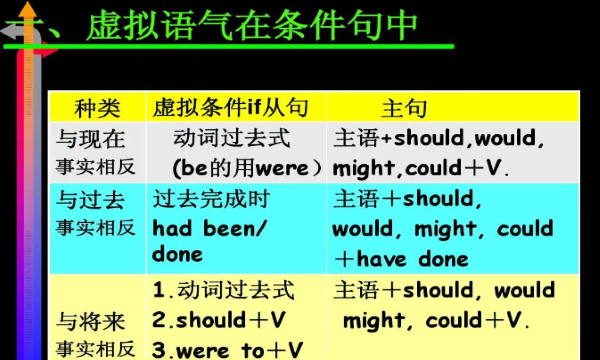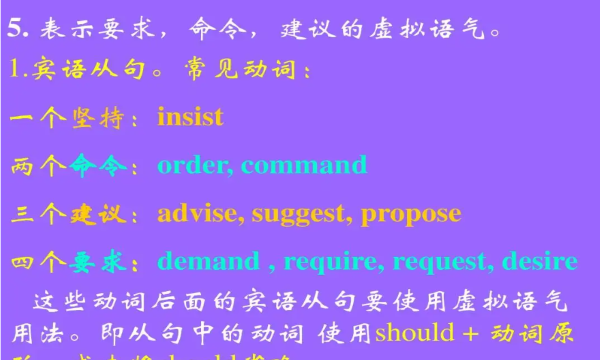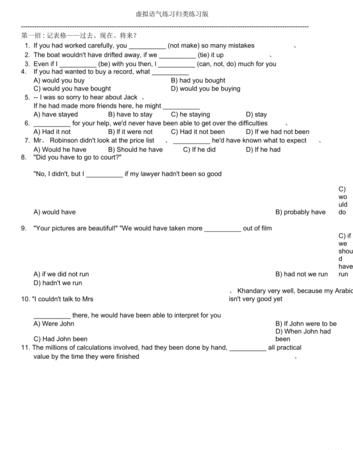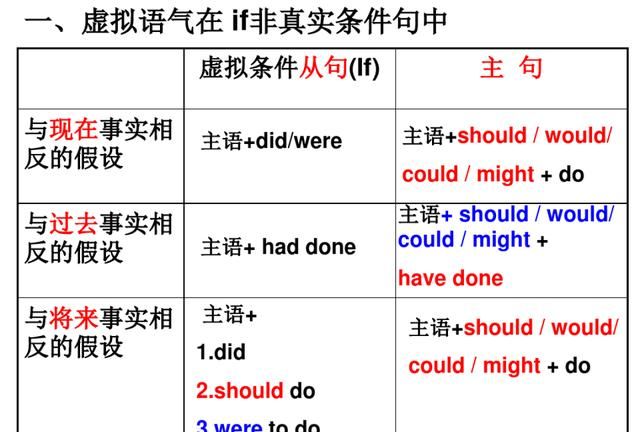本文目录
wish虚拟语气的用法归纳表格
完整虚拟语气用法归纳如下:
1. 与现在事实相反的虚拟语气,if从句中的谓语用过去式(be用were)。
主句用would/could/might should+动词原形。
例:
If I had enough money, I would buy myself a computer.
我如果有足够的钱,会为自己买一台电脑。
If I were you, I would forgive Mary.
如果我是你,我就会原谅玛丽。
2. 与将来事实相反的虚拟语气,从句谓语过去式(be用were)/should+动词原形/were to+动词原形,主句谓语would/could/might/should do.
例:
If I saw/should see/were to see him tomorrow, I would invite him home.
我如果明天见到他,会邀请他到家里来。
If I were to do the job, I would do it in a different way.
要是我来做这项工作,我会用另一种方法。

3. 与过去事实相反的虚拟语气,主句谓语should/would/could/might+have+过去分词,If 条件从句的谓语形式had+过去分词词。
例:
If we had had enough rain last year,we could have gained a good harvest.
如果去年雨水充足的话,我们可能会有一个好收成。
If the weather had been nice yesterday,we would have gone for a picnic.
如果昨天天气好的话,我们就去野餐了。
4. wish后的宾语从句用虚拟语气,从句的谓语形式虚拟情况:
与现在事实相反用:过去式(be用were)。
与过去事实相反had+过去分词。
与将来事实相反would/ could/might+动词原形。
例:
I wish (that) I were a bird and could fly freely in the sky.
我希望我是一只鸟,可以在天空中自由地飞翔。
I wish(that)I had met that writer.
我希望遇到过那位作家。
I wish I could help him. 我希望我能帮助他。

5. would rather后的宾语从句用虚拟语气虚拟情况表示现在或将来的愿望,从句的谓语形式过去式( be用were),表示过去的愿望,用had+过去分词。
例:
I would rather you came next Saturday.
我宁愿你下周六来。
I would rather you had taken the place of me.
我宁愿你顶替了我。
6. as if/as though 引导的虚拟语气:
as if/as though引导的虚拟语气谓语的形式与wish后的宾语从句的谓语形式一致。
例:
She talked about the film as if she had really seen it.
她谈论那部影片,就好像她确实看过一样。
It seems as if it were spring already.
现在仿佛已是春天了。
(误区警示)如果与事实相符,as if/as though后的从句用陈述语气。
例:
It looks as if it is going to rain.
仿佛天要下雨。(马上就要下雨)
It seems as if the boy has lost his way.
这个男孩好像迷路了。
7. if only...句式用虚拟语气:
if only 意为“要是······就好了”,其后虚拟语气的用法与wish后的宾语从句的谓语形式一致。
例:
If only I were 20 years younger!
我要是年轻20岁该多好啊!(与现在事实相反)。
If only I had come to the party yesterday!
要是昨天我来参加聚会就好了!(与过去事实相反)。
If only I could fly to the moon one day.
要是有天我能飞上月球就好了。(与将来事实相反)。
要不是你的帮忙英语虚拟语气
1.要是我们把单词都背过了,我们就得100分了。
We would get 100 percent if we memorized all the words. 或
We would get perfect if we reviewed every single word.
2.要是S早点来多好啊。
It'd be better if S comes earlier. *it'd = it would
3.K给我们讲这个故事,好象他看过这个电影似的。
K told us this story as if he saw the movie himself.
4.我们希望明天凉爽一些。
We hope it'd be cooler tomorrow. 或
We hope the weather would be better tomorrow.
5.K建议老师应多留点作业。
K suggested to the teacher to give us more homework.
6.要是我们没有花那么多时间多好啊。
It'd be even better if we didn't spend that much time.
7.Z希望她知道这些问题的答案。
Z would like to know the answers to these question.
因为我不sure"她"指的是不是Z本人 如果不是的话,就用以下的:
Z would like her to get the answers to these questions.
8.奇怪吧,他不辞而别。
Weird! They left without saying bye. 或
It's weird that they left without saying anything.
9.如果你们上午来上课,你们就能看见L了。
You woud see L if you came to class in the morning. 或
If you guys came to class in the morning, you would be able to see L.
10.如果我们听老师的话,我们都能作对了。
If we listened to the teacher, we would get perfect. 或
We would get perfect if we listened to the teacher.

“for fear that”虚拟语气用法是什么
1、for fear that +主语+ should +动词原形
2、for fear that I (should) disturb you句中的should可以省去。
for fear that
读音:英 [fɔː(r) fɪə(r) ðæt] 美 [fɔːr fɪr ðæt]
释义:因为害怕。
语法:意为“以免,唯恐”。常用于引导目的状语从句表示否定,只用于书面语。表示“惊恐”“忧虑”的动词后引导宾语从句,相当于that。

扩展资料
for fear that的近义词:lest
lest
读音:英 [lest] 美 [lest]
释义:免得,以免,(引出产生某种情感的原因)唯恐。
语法:lest所引导的从句中谓语动词要用虚拟式,即“(should+)动词原形”。
例句:
I was afraid to open the door lest he should follow me.
我不敢开门,唯恐他还跟着我。
初三英语虚拟语气知识点
虚拟语气用来表示说话人的主观愿望或假想,而不表示客观存在的事实,所说的是一个条件,不一定是事实,或与事实相反。虚拟语气通过谓语动词的特殊形式来表示。英语中的语气分为陈述语气、祈使语气、虚拟语气三类。
[编辑本段]应用条件
虚拟语气常在表示条件和结果的状语从句中。在表示与事实相反的虚拟语气时动词有三种时态:现在时,过去时,将来时。
在条件句中的应用:条件句可分为两类,一类为真实条件句,一类为非真实条件句。非真实条件句表示的是假设的或实际可能性不大的情况,故采用虚拟语气。
在什么情况下用虚拟语气
在表示虚假的、与事实相反的或难以实现的情况时,用虚拟语气,表示主观愿望或表示某种强烈情感时,也用虚拟语气。
[编辑本段]虚拟语气在非真实条件状语从句中的用法
1、真实条件状语从句与非真实条件状语从句
eg .
If he doesn’t hurry up, he will miss the bus. 如果他不快点,他将错过巴士。( 真实条件状语)(不是虚拟语气)
If he was free, he would ask me to tell stories. 如果他是空闲的,他会要求我讲故事。(真实条件状语)(不是虚拟语气)
If I were you, I would go at once.如果我是你,我马上就会去。 (非真实条件状语从句)
If there were no air, people would die. 如果没有空气,人就会死亡。(非真实条件状语从句)
2、虚拟语气在非真实条件状语从句中的用法及动词形式
① 表示与现在事实相反的情况:
主语+should/would/could/might+do+其他+if+主语+did/be(were)+其他
例:
1.If I were you, I would take an umbrella.如果我是你,我会带把伞。(事实:我不可能是你)
2.If I knew his telephone number, I would tell you. 如果我知道他的电话号码,我就会告诉你。(事实:不知道)
3.If there were no air or water, there would be no living things on the earth. 如果没有水和空气,地球上就不会有生物。(事实:地球上既有空气也有水)
4.If I had any money with me, I could lend you some. 如果我带钱了,我就会借给你些。(事实:没带钱)
5.If he studied harder, he might pass the exam.如果他再努力些,就能通过考试了。(事实:学习不用功)
②表示与过去事实相反的情况
主语+should/would/could/might+have done+其他+if+主语+had done +其他
例:
1. If I had got there earlier, I should/could have met her. 如果我早到那儿,我就会见到她。(事实:去晚了)
2.If he had taken my advice, he would not have made such a mistake. 如果他听我的劝告的话,就不会犯这样的错误了。(事实:没有听我的话)
③表示对将来情况的主观推测(可能相反或可能性很小)
主语+should/would/could/might+do+其他+if+主语+did/should/were to do+其他
例:
1.If he would come here tomorrow, I should/would talk to him. 如果他哪天来这儿的话,我就跟他谈谈。 (事实:来的可能性很小)
2.If there were a heavy snow next Sunday, we would not go skating. 如果下周日下大雪,我们就不能去滑冰了。(事实:不知能否下雪)
3.If she were to be there next Monday, I would tell her about the matter. 如果她下周一来这儿的话,我就会告诉她这件事得始末。
在表示建议、命令、要求等含义的宾语从句,谓语动词常用虚拟语气,"should+动词原形"构成,should 可省略。
[编辑本段]虚拟语气的其他用法
①、虚拟语气用在wish 后的宾语从句
a、表示与现在事实相反的愿望,谓语动词用过去式
eg. I wish I had your brains.我希望我有你那样的头脑。(事实:我根本比不上你)
b、表示过去事实相反的愿望,谓语动词:had+v-ed
eg:.I wish I had known the truth of the matter.我希望我原来知道这件事的真相。(事实:原来不知道)
c、表示将来难以实现的愿望
谓语动词:should/would + 动词原形
eg. I wish I should have a chance again.我希望我还能有一次这样的机会。(事实:很难再有这样的机会了)
(注:if only和even if也有相同用法)
②虚拟语气用在 一想要(desire)一宁愿(prefer)二命令(order. command) 三建议(advise. suggest. propose) 五要求(demand. require. request. desire.insist)中,无论主句谓语动词为何种时态,从句的谓语动词都用:“should + 动词原形”或只用“动词原形”。
如 He suggested that we (should) take the teacher’s advice
He insisted that we (should) take the teacher’s advice
He demand that we (should) take the teacher’s advice
He ordered that we (should) take the teacher’s advice
注:insist如果翻译成坚持某种动作才用虚拟语气翻译成坚持某种观点就不用虚拟语气。
如:He insist he is a student. 他坚持说他是个学生。
这个语句表示的是事实,因此在这个语句中不能使用虚拟语气。
suggest意为“建议”才用虚拟语气,意为“暗示”则不用虚拟语气。
如: His face suggests that he looks worried .他的表情暗含着他很担心。
这个句子本身是事实,因此它就没有用到虚拟语气。
③表情绪.观点的形容词或名词也要用虚拟语气.如:necessary. important. impossible. natural. strange. surprising.
funny. right. wrong. better. a pity等。
句型:It is.......that 结构后的主语从句,从句的谓语动词都要用 should+原型 或只用动词原型。
④虚拟语气在方式状语从句的应用。详百度百科之方式状语从句词条。

以上就是关于虚拟语气例句00个,wish虚拟语气的用法归纳表格的全部内容,以及虚拟语气例句100个 的相关内容,希望能够帮到您。

